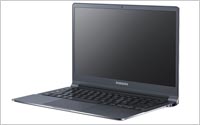Ultrabooks Growth To Outpace Tablets
- by Mark Walsh @markfwal, January 24, 2012
 Move over, tablets -- here come ultrabooks.
A new forecast from U.K.-based Juniper Research projects that sales of so-called ultrabooks -- the fast, thin, lightweight laptops designed to take on the MacBook Air -- will grow at three times the
rate of tablets over the next five years.
Move over, tablets -- here come ultrabooks.
A new forecast from U.K.-based Juniper Research projects that sales of so-called ultrabooks -- the fast, thin, lightweight laptops designed to take on the MacBook Air -- will grow at three times the
rate of tablets over the next five years.
However, tablet volume will remain higher, with 253 million expected to be shipped in 2016, compared with 178 million ultrabooks.
Ultrabooks was one of the big buzzwords at CES this month, where a slew of the sleek new models debuted. Intel, which claims a trademark on the term “Ultrabook,” is driving the push behind the devices to bolster the slumping PC market. It expects more than 75 new ultrabooks to launch this year. Some will have 14- and 15-inch screens. Samsung, Lenovo, Acer and Vizio are among the manufacturers that have jumped on the ultrabook bandwagon.
But Juniper warned that without significantly differentiating their products from Apple in terms of features or pricing, gaining traction for the new wave of competitors won’t be easy.
"While Intel's control of the brand ensures that Ultrabooks stand out from traditional notebooks, vendors face a balancing act in terms of product strategy,” noted report author Daniel Ashdown. “Meeting Intel's specification secures brand status and funding, but the step-change from notebooks means that many of today's Ultrabooks are too expensive for many consumers."
Among other findings, the study said Windows 8 will play a key role in driving ultrabook adoption, with extended battery life, an always-on connection and other features coming with an updated version of Microsoft’s operating system.
As competition from tablets and low-cost but high-performance ultrabooks erodes demand for netbooks, Juniper also sees the volume of netbook shipments shrinking to a third of today’s levels by 2016. A report released by the Pew Research Center Monday showed that tablet ownership nearly doubled over the holidays from 10% of U.S. adults to more than 19%.
Because ultrabooks are not a substantially new category, mobile consultant Chetan Sharma predicted in a post-CES wrap-up that they will simply end up eating into the share of traditional notebook computers.


